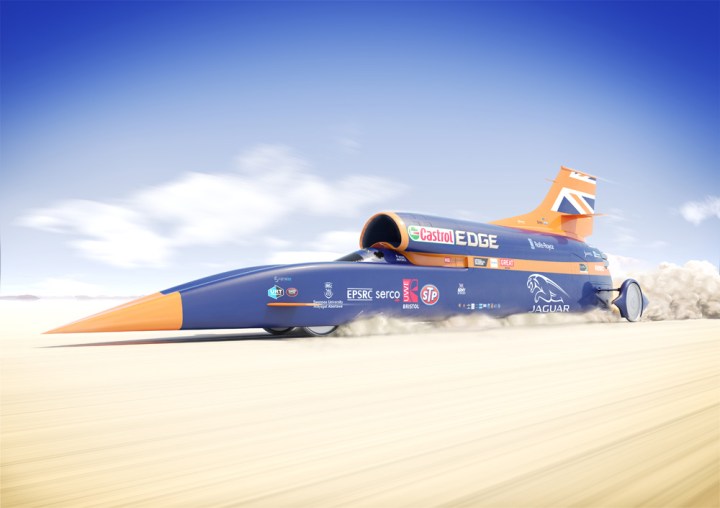
A company bidding to drive a car at an eye-watering 1,000 mph has been forced to put the brakes on the project while it seeks extra funds to help it reach its goal.
The U.K. team behind the rocket-powered Bloodhound car needs investment of 25 million British pounds (about $33 million) in the next few weeks or it may have to wave goodbye to its speed-record dream, the BBC reported on Monday, October 15.
The troubling news comes exactly a year after the extraordinary vehicle reached 210 mph in a public test run ahead of a planned 1,000-mph drive in Hakskeen Pan — a vast, dried-out lake bed — in South Africa in 2020.
For last year’s run, which tested the car’s responsiveness and stability among other things, the Bloodhound car was powered by a Rolls-Royce EJ200 jet engine that’s normally found on a Eurofighter Typhoon combat aircraft.
For the record attempt, however, the team wants to use three Nucleus rocket motors developed by Scandinavian firm Nammo, in addition to the EJ200 jet engine. But those plans now appear to be balanced on a knife’s edge as the company, Bloodhound Programme, seeks emergency funding.
Speaking to the BBC, Andrew Sheridan of FRP Advisory, the firm aiming to free Bloodhound Programme from its financial difficulties, described the rocket-powered car as “a project that is very much alive and on the cusp of delivering its goal, which is ground-breaking with leading technology.”
Sheridan added: “However, it does need circa 25 million British pounds to get it over the line, and that now requires an investor, be that a wealthy individual or a corporate of some kind.”
If the team behind the supersonic car can secure the vital funds and continue toward its goal, it could yet have a chance to break the current land speed record of 763.035 mph set in 1997. The record-breaking vehicle was the Thrust SSC and in the driving seat was Andy Green, the very same guy behind the wheel of the Bloodhound during its 210 mph test run last year and the person hoping to have a go at setting the new record in South Africa.
Mark Chapman, Bloodhound‘s chief engineer, told the BBC that if they can find an investor, then they could be prepping for the speed record within just 10 months. “We’re that close,” he said.
Editors' Recommendations
- Bloodhound supersonic car can be yours for just $11 million
- Bloodhound supersonic car eyes land speed record after 500 mph test run
- The 1,000-mph land speed record is back on with test runs starting this month


